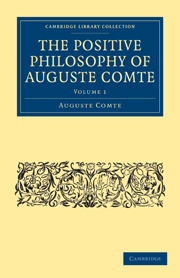CHAPTER IV - ACOUSTICS
Published online by Cambridge University Press: 29 August 2010
Summary
Its nature
This science had to pass, like all the rest, through the theological and metaphysical stages; but it assumed its positive character about the same time with Barology, and as completely, though our knowledge of it is, as yet, very scanty, in comparison with what we have learned of gravity. The exact information which was obtained in the middle of the seventeenth century about the elementary mechanical properties of the atmosphere, opened up a clear conception of the production and transmission of sonorous vibrations. The analysis of the phenomena of sound shows us that the doctrine of vibrations offers the exact expression of an incontestable reality. Besides its philosophical interest, and the direct importance of the phenomena of Acoustics, this department of Physics appeals to special attention in two principal relations, arising from its use in perfecting our fundamental ideas regarding inorganic bodies, and Man himself.
Relation to the study of inorganic bodies
By studying sonorous vibrations, we obtain some insight into the interior mechanical constitution of natural bodies, manifested by the modifications undergone by the vibratory motions of their molecules. Acoustics affords the best, if not the only means for this inquiry; and the small present amount of our acquisitions seems to me no reason why we should not obtain abundant results when the study of acoustics is more advanced. It has already revealed to us some delicate properties of natural bodies which could not have been perceived in any other way.
- Type
- Chapter
- Information
- The Positive Philosophy of Auguste Comte , pp. 255 - 264Publisher: Cambridge University PressPrint publication year: 2009First published in: 1853

